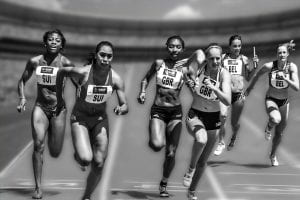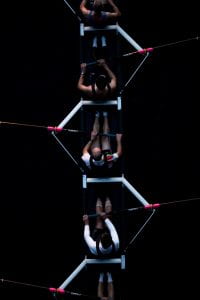As someone whose list of passions in life is topped by science and sport, I was delighted to see Liz Nicholl, Chief Executive of UK Sport, on the bill at a conference on the culture of scientific research. And she wasn’t alone in drawing on the sporting world for inspiration, as Prof Leanne Hodson and her PhD student Pippa Gunn gave an inspirational talk comparing the running of a lab with a rowing eight. All this got me thinking about the parallels between these two worlds, science and sport, especially around the themes of competition and teams. What could we learn from sport to make positive changes in research culture?
 Competition was a big theme throughout the conference, and among the majority it seemed clear that for science it’s considered a Bad Thing. A culture which prizes the individual glory of a very few was seen to be a major contributor to high stress levels, bad behaviour, and to many young researchers feeling undervalued in their work. But sport – professional sport at least – is unashamedly competitive. We play to win. We also celebrate individuals – the top goal scorer, the gold medallist, the yellow jersey. What makes this more acceptable in sport than in science?
Competition was a big theme throughout the conference, and among the majority it seemed clear that for science it’s considered a Bad Thing. A culture which prizes the individual glory of a very few was seen to be a major contributor to high stress levels, bad behaviour, and to many young researchers feeling undervalued in their work. But sport – professional sport at least – is unashamedly competitive. We play to win. We also celebrate individuals – the top goal scorer, the gold medallist, the yellow jersey. What makes this more acceptable in sport than in science?
My sense is that it comes down to how we value the team. In team sports, this is clear. An individual might deliver a brilliant performance, but we recognise that he or she did that with the support of their team. And the whole team, including the supporters, share in the result and the glory. ‘Man of the match’ is something for the individual to aspire to, but probably means much less to them than winning the cup or league with their team. Even those competing in individual sports effectively do so as part of a team – team GB for instance. And these teams are recognised, valued and celebrated, as much as the individual, in some cases more. If we think back to our success in the last two Olympic Games, we might remember a few brilliant individuals, but what we really celebrate is the total medal haul of the team.
 How does this compare with science? We talk of teams of researchers, striving for shared goals, but in fact a research group is much more a collection of individuals, all working to their own objectives, mainly because they will always be judged as individuals. In navigating the career ladder, it’s all about presenting independent, personal work, and ultimately any big prizes go to an individual or individuals, not a team. When a scientist achieves a major breakthrough, we know there are likely to be many others who have contributed to that work in many different ways. They might be lucky to get acknowledgement from a prize winner, or share in the excitement of having been part of something big, but ultimately reflected glory doesn’t carry much weight on the job market, which is where it needs to count. Like the domestiques of science, postdocs may well end up toiling away for the glory of their lead rider.
How does this compare with science? We talk of teams of researchers, striving for shared goals, but in fact a research group is much more a collection of individuals, all working to their own objectives, mainly because they will always be judged as individuals. In navigating the career ladder, it’s all about presenting independent, personal work, and ultimately any big prizes go to an individual or individuals, not a team. When a scientist achieves a major breakthrough, we know there are likely to be many others who have contributed to that work in many different ways. They might be lucky to get acknowledgement from a prize winner, or share in the excitement of having been part of something big, but ultimately reflected glory doesn’t carry much weight on the job market, which is where it needs to count. Like the domestiques of science, postdocs may well end up toiling away for the glory of their lead rider.
So does it make sense to get rid of competition in science? We know that many a major advance in science has been accelerated when multiple research groups have been focused on the same question. But would this aspect of research culture be more palatable if the success could be shared more across the team, as it is in sport? Let’s start giving prizes in science to teams – something that wouldn’t be too difficult to introduce. A bigger culture change, but one we should aim for, is to establish ways to make sure we give credit to everyone who makes a contribution to an outstanding piece of work. This was an idea we heard again and again at Changing Expectations, but if we could really make it happen, the research team finally becomes a real team. If we can do this, we needn’t fear competition, and then like any sports team, we can all play to win.
Liz Simmonds
Postdoc Careers Adviser, University of Cambridge
(originally published in ‘Research culture: changing expectations’ – conference report, The Royal Society)
